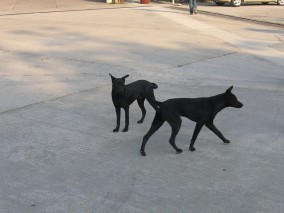 Weeks after my girlfriend ended our relationship of seven years, I moved from the island side to a quieter, greener part of Hong Kong, hemmed by country parks, opposite a reservoir. She ended up moving to a nearby block on the same street. Together we had accumulated three stray dogs and three stray cats, and they were still a family even if we were not. We swapped spare keys and agreed to a time-share arrangement for our pets. I couldn’t imagine a scenario in which I took three and she took three. Losing her had been enough.
Weeks after my girlfriend ended our relationship of seven years, I moved from the island side to a quieter, greener part of Hong Kong, hemmed by country parks, opposite a reservoir. She ended up moving to a nearby block on the same street. Together we had accumulated three stray dogs and three stray cats, and they were still a family even if we were not. We swapped spare keys and agreed to a time-share arrangement for our pets. I couldn’t imagine a scenario in which I took three and she took three. Losing her had been enough.
Most afternoons around four o’clock, I take our fittest dog for a walk to the reservoir. On the way we pass a crematorium, a columbarium, a line of grey-haired men flying toy helicopters, and on Tuesdays, a young guy practicing the bagpipes. Inside the park, stray dogs forage for scraps. They are puppies of dogs that have been abandoned. Semi-domesticated dogs that struggle to fend for themselves. I take all the dog food I can carry.
Once I watched a black Mercedes drive up to the reservoir. A well-dressed woman with perfectly coiffed hair got out and opened the back door. Out hopped two elderly black dogs. I watched in astonishment as the woman slipped off their collars, got back into her car and drove away. I approached the dogs, but they were fearful of my dog and wouldn’t come close. Later that day, I went back alone but the dogs were gone. A week later, I found them waiting at the same spot the woman had left them, their foreheads creased with worry. I sat down on the gutter and made two large piles from the mix of brown rice, vegetables, and tuna I had inside my backpack. They waited until I stepped aside and devoured their meal.
The stray dogs share the park with more than 2000 monkeys. The monkeys are said to be descendants of pets kept by wealthy Hong Kong residents in the 1920s. Most of them were turned out into the wild where they multiplied. Others are said to be the offspring of monkeys that belonged to a Tibetan acrobat troupe that visited Hong Kong in 1960. After their shows in Hong Kong finished, the troupe was told they could not take the monkeys to their next destination, so they released them into the wild.
I no longer carry dog food inside a backpack. Months ago, a male monkey swung at me from a tree and grabbed my backpack from my shoulder. He flashed his teeth and hissed at me. I let go of my dog’s leash so she could escape. She didn’t. She stood her ground and barked. The monkey dropped my backpack and lunged at her. Terrified, she bolted home. He gave chase for a while then returned to my bag. I raced after my dog. These days I carry the food in a plastic bag. If monkeys appear, I drop the bag and leave them to it.
Occasionally I come upon a litter of puppies, set down food, and hear a rustle in the trees behind me as a troop of monkeys fights its way through the branches towards us. Frightened, the puppies scramble back to their den, the slowest ones nudged along by their mother. Once I saw a large male dog try to protect a puppy from an enormous male monkey. He dug his paws into the ground, barred his teeth and growled. The monkey watched for an instant, bemused, before turning on the dog and attacking him. The dog slipped the monkey’s grasp and escaped. In a contest between dog and monkey, it’s the dog that comes off second best.
At Chinese New Year, when the buildings in my street are festooned with red and gold, and potted cumquat trees line driveways, the monkeys sit along the gutter like delinquent teenagers and take turns tearing across the road. They load up their arms with as much fruit as they can carry, dash back to the safety of the sidewalk and gobble down their haul. By morning, the plants are stripped of fruit.
Yesterday, as I walked our dogs up the steep path to my ex-girlfriend’s place, a large male monkey stalked us. We let him pass and watched him swagger through the middle of the car park. Once he had gone, we went upstairs and I used my spare key to let our dogs inside. I went home to three hungry cats.
Sarah Vallance is a recent graduate of the MFA program at City University in Hong Kong. Her work has been published in Cutbank Literary Review and Two Thirds North, and she has essays forthcoming in the Gettysburg Review and The Pinch Literary Review.

